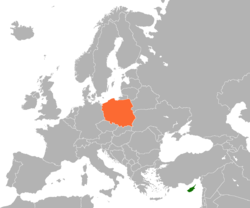
Cyprus is a member of the United Nations along with most of its agencies as well as the Commonwealth of Nations, World Bank, International Monetary Fund and Council of Europe. In addition, the country has signed the General Agreement on Tariffs and Trade (GATT) and the Multilateral Investment Guarantee Agency Agreement (MIGA). Cyprus has been a member of the European Union since 2004 and in the second half of the 2012 it held the Presidency of the Council of the European Union.
The Republic of Poland is a Central European country and member of the European Union and NATO, among others. Poland wields considerable influence in Central and Eastern Europe and is a middle power in international affairs. The foreign policy of Poland is based on four basic commitments: to Atlantic co-operation, to European integration, to international development and to international law.
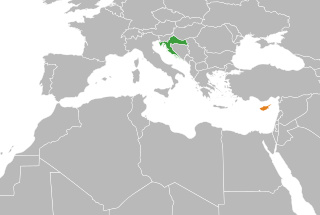
Croatia and Cyprus established diplomatic relations on February 4, 1993. The Croatian embassy in Rome (Italy) is also accredited as a non resident embassy to Cyprus. Croatia has an honorary consulate in Nicosia. The Cypriot embassy in Vienna (Austria) is also accredited as a non resident embassy to Croatia. Cyprus has an honorary consulate in Zagreb. Both countries are full members of the Council of Europe and the European Union. Cyprus joined the EU in 2004, and Croatia joined the EU in 2013.

Cypriot–Russian relations refers to bilateral foreign relations between the Republic of Cyprus and the Russian Federation. The Soviet Union established diplomatic relations with the newly independent Republic of Cyprus on 18 August 1960. Cooperation between both countries has increased since the 1990s because of the end of the Soviet Union. Cyprus has an embassy in Moscow, and Russia has an embassy in Nicosia.
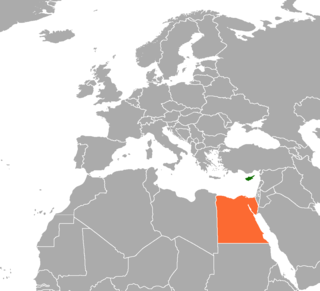
Cyprus–Egypt relations refer to bilateral relations between Cyprus and Egypt. Due to the strong cultural and historical ties between the two nations, Cyprus and Egypt today enjoy friendly, and strategic relations. Modern diplomatic relations between the two countries were established soon after Cyprus gained its independence in 1960, and are regarded as cordial. Cyprus has an embassy in Cairo and Egypt has an embassy in Nicosia.

Cyprus–Denmark relations refers to the current and historical relations between Cyprus and Denmark. Cyprus has an embassy in Copenhagen. Denmark has an embassy in Nicosia. Diplomatic relations were established on 2 November 1960. Both countries are members of the European Union.
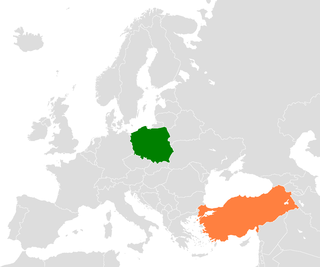
Polish–Turkish relations are the foreign relations between Poland and Turkey. Both countries are full members of NATO, OECD, OSCE, the Union for the Mediterranean, the Council of Europe and the World Trade Organisation. Poland is a member of the European Union, Turkey is not a member.

Cyprus-Spain relations are the bilateral relations between Cyprus and Spain. The relations are defined mainly by the membership of both countries to the European Union, Council of Europe and Organization for Security and Co-operation in Europe, and the Union for the Mediterranean. Cyprus has an embassy in Madrid and consulates in Barcelona, Bilbao, Sevilla and Granada. Spain has an embassy in Nicosia.

Estonia–Poland relations is the official relationship between Estonia and Poland. Both nations enjoy close and friendly relations, and are close allies. Both nations are members of the European Union, NATO, OECD, OSCE, Bucharest Nine, Three Seas Initiative, United Nations, Council of Europe, Council of the Baltic Sea States, HELCOM and World Trade Organization. The two countries became members of the European Union in 2004.
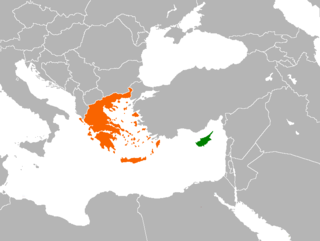
Cyprus–Greece relations are the bilateral relations between Cyprus and Greece. Cyprus has an embassy in Athens and a consulate-general in Thessaloniki. Greece has an embassy in Nicosia. Both countries are full members of the United Nations, European Union, Council of Europe and the Organization for Security and Co-operation in Europe (OSCE). Relations between the two countries have been exceptionally close since the Republic of Cyprus was formed in 1960. The Greek populations in Cyprus and Greece share a common ethnicity, heritage, language, and religion, leading to an exceptionally close relationship between the two countries. Greece has given full support to Cyprus's membership in the European Union.
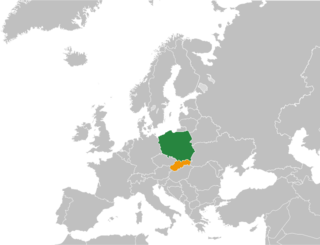
Polish–Slovak relations are foreign relations between Poland and Slovakia. Both nations are members of the European Union and NATO. Both joined the EU simultaneously on 1 May 2004. Both countries form together with the Czech Republic and Hungary the Visegrád Group, which is an important regional group in Central Europe. Both are a majority speaking west slavic languages.

Cyprus–Israel relations refer to the bilateral relations between Cyprus and Israel. Israel has an embassy in Nicosia, while Cyprus has an embassy in Tel Aviv. Both countries are members of the Union for the Mediterranean, United Nations, Euro-Atlantic Partnership Council, Organisation for Economic Co-operation and Development, International Monetary Fund, World Bank, and World Trade Organization.

Cyprus–Sweden relations are foreign relations between Cyprus and Sweden. The two countries are members of the European Union, Council of Europe, the Organization for Security and Co-operation in Europe (OSCE) and the Union for the Mediterranean. Cyprus has an embassy in Stockholm. Sweden has an embassy in Nicosia (Cyprus).

Foreign relations have reportedly always been strong between Armenia and Cyprus. Cyprus has been a supporter of Armenia in its struggle for the recognition of the Armenian genocide, economic stability and the resolution to the Nagorno-Karabakh conflict. In return Armenia has been advocating a stable Cyprus after the Turkish invasion in 1974 and supporting a lasting solution to the Cyprus dispute.
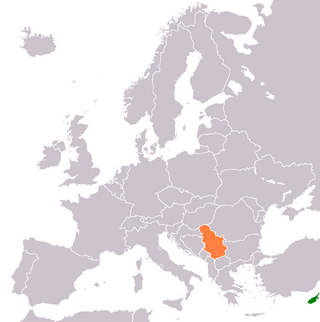
Cyprus–Serbia relations are considered as strong, due to common European policies and the sharing of Orthodoxy as a common religion. Cyprus has been a supporter of Serbia in its efforts to join the European Union. Likewise, Serbia has been advocating a stable Cyprus after the Turkish invasion in 1974 and supporting a lasting solution to the Cyprus dispute.

Cyprus–Germany relations are the bilateral relations between Cyprus and Germany. Germany is represented in Cyprus through its embassy in Nicosia, Cyprus. Cyprus is represented in Germany through its embassy in Berlin, Germany. Both countries are members of the European Union, Council of Europe and Organization for Security and Co-operation in Europe.
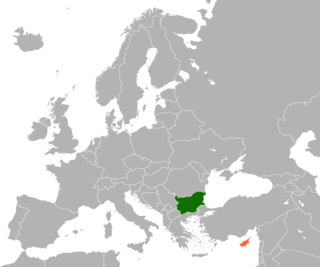
Bulgaria–Cyprus relations are the close diplomatic relations between Cyprus and Bulgaria. Bulgaria was one of the first countries to recognise Cypriot independence in 1960, leading to the celebration of 50 years of diplomatic relations between the two countries in 2010. These relations have developed positively on the international stage as well as in commerce and strategic affairs. Bulgaria has an embassy in Nicosia and a consulate general in Limassol. Cyprus has an embassy in Sofia and a branch office in Burgas. Both countries are full members of Council of Europe and of the European Union. Bulgaria in as member of the EU in 2007. Cyprus in as member of the EU in 2004.

Poland–Sweden relations are historical and bilateral relations between Poland and Sweden. Both countries are separated by the Baltic Sea and have had a very long historical contact. They have also survived several conflicts between the two countries as well. At the beginning of the 20th century, Poland and Sweden enjoyed a close relationship, which was interrupted by the Soviet and German invasion of Poland, which started World War II. After the war, both re-established relations and Sweden has become the largest economic contributor for Poland among the Nordic countries. Both Poland and Sweden are members of the EU, NATO, OECD, OSCE, Council of the Baltic Sea States, HELCOM, Council of Europe and the World Trade Organization. There are over 90,000 Poles in Sweden and residents from both countries visit each other frequently. Sweden has given full support to Poland's membership of the European Union. Poland strongly supported Sweden's NATO membership.

Albania–Poland relations are diplomatic relations between the Republic of Albania and the Republic of Poland. Poland was the first Slavic nation to recognize Kosovo as an independent entity, the relationship between two nations is quite low than expected. Nonetheless, two countries have been working closer since the fall of communism at 1989 and there has been strong renewal of relationship between two nations.

Moldova–Poland relations refers to the relationship between Moldova and Poland. The two countries established relations following the independence of Moldova at 1991. Poland is a member of the European Union, which Moldova applied for in 2022. Both countries are full members of the Council of Europe. Also Moldova is an EU candidate and Poland is an EU member.
